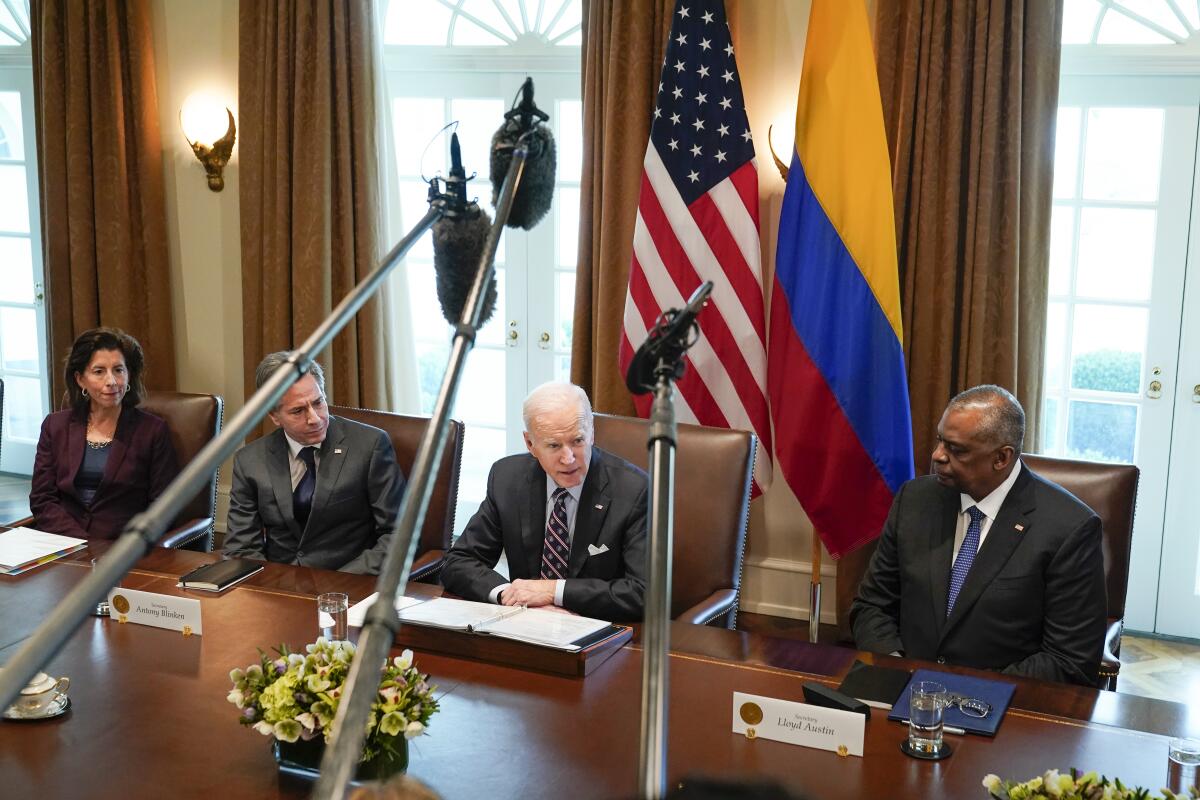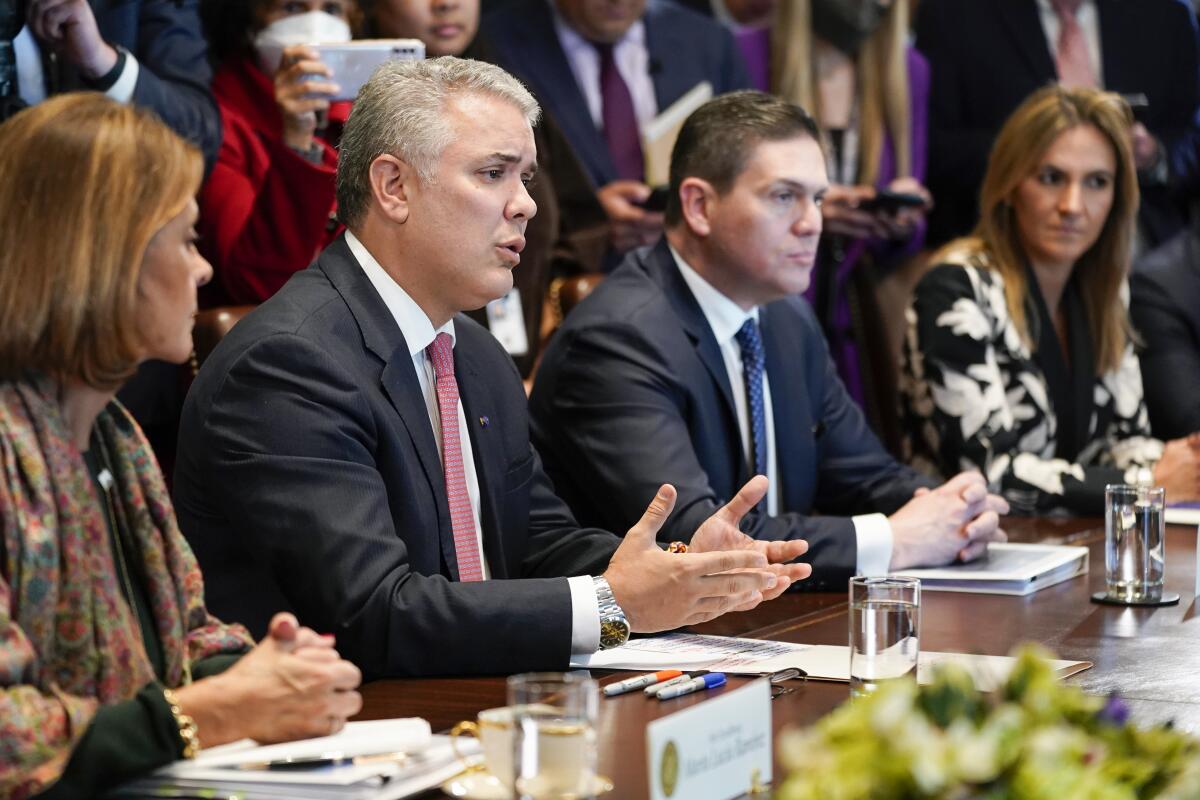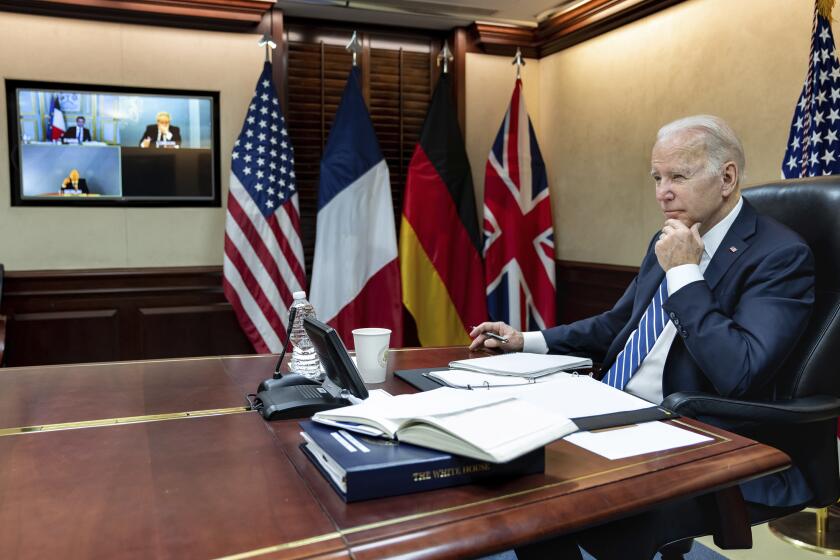Biden names Colombia ‘major non-NATO ally,’ countering Putin’s influence in Latin America

- Share via
WASHINGTON — President Biden announced Thursday that he will name Colombia as a major non-NATO ally, a significant recognition as the United States tries to undercut Russian President Vladimir Putin’s influence in Latin America after his invasion of Ukraine.
The special status has been given to only two other Latin American nations — Argentina and Brazil — and signals a very close relationship between the United States and countries not part of the North Atlantic Treaty Organization.
The designation provides Colombia with certain trade benefits and boosts opportunities for security cooperation between the two countries— including Colombia’s potential eligibility to purchase depleted uranium ammunition, according to the State Department.
It also comes as the Biden administration weighs lifting sanctions on Colombia’s oil-rich neighbor Venezuela, in an effort to make up for any gap left by the U.S. ban on Russian energy imports — a move Colombia strongly opposes.
Ahead of a 45-minute meeting with Colombian President Iván Duque at the White House, Biden said the recognition signals the “unique and close relationship” between the countries and said the South American nation is the “linchpin” of the Northern and Southern hemispheres. “Colombia is a keystone to our shared efforts to build a hemisphere as prosperous, secure and democratic,” Biden said.
Duque, whose term ends in August, later thanked Biden and said the designation recognizes “the principles and values that we have shared.”

Colombia has long been a close ally for both Democratic and Republican administrations; it is championed as a relatively stable and prosperous nation in a region with numerous corrupt or pro-Russia leaders.
At the United Nations General Assembly vote calling on Russia to withdraw from Ukraine, Nicaragua and Cuba abstained. Venezuela did not vote because it has fallen behind on member dues. Brazilian President Jair Bolsonaro said his country would remain neutral but denigrated Ukrainian President Volodymyr Zelensky, whose wartime leadership has drawn international acclaim.
At the White House, Duque was much more forceful in strongly condemning Putin, saying that the invasion of Ukraine “has been a very horrifying moment for the world” and that “nothing justifies the bloodbath.”
“We also have to say that in the times we are facing, we have made a strong stand against the brutal, unjustified attack from Russia to Ukraine,” Duque told reporters after his meeting.
To soften the impact of a ban on Russian oil, President Biden considers reducing restrictions on oil imports from Venezuela, a politically problematic step.
Duque’s conservative government has also been especially useful to Washington as a counterbalance to Venezuela. Colombia has been a haven for American diplomats who have either been withdrawn or expelled from Caracas, and for Venezuelan politicians opposed to President Nicolas Maduro, who consolidated power after a 2018 election widely condemned as fraudulent.
Duque has objected to the possibility that the Biden administration would lift punitive sanctions on Venezuela, which is sitting on one of the world’s largest oil reserves.
“If you’ve just banned oil from what they call the Russian dictator, it’s difficult to explain why are you going to be buying oil from the Venezuelan dictator,” Colombia’s minister of energy and mining, Diego Mesa Puyo, told the Financial Times.
During their meeting, the presidents discussed topics including COVID-19 and migration.
Colombia bore the brunt of a mass exodus of refugees from Venezuela following its economic collapse after the 2018 presidential election and won praise in many circles for accommodating the new arrivals, a move that also helped reduce their flow northward to the United States. In February, Duque was applauded internationally after granting more than 1.8 million Venezuelans temporary protected status for a decade.
At the White House, the presidents said they would work toward a regional declaration on migration and protection at the Summit of the Americas, which is expected to take place in June in Los Angeles.
Times staff writer Andrea Castillo contributed to this report.
More to Read
Get the L.A. Times Politics newsletter
Deeply reported insights into legislation, politics and policy from Sacramento, Washington and beyond. In your inbox twice per week.
You may occasionally receive promotional content from the Los Angeles Times.













